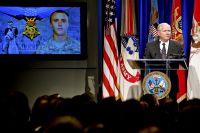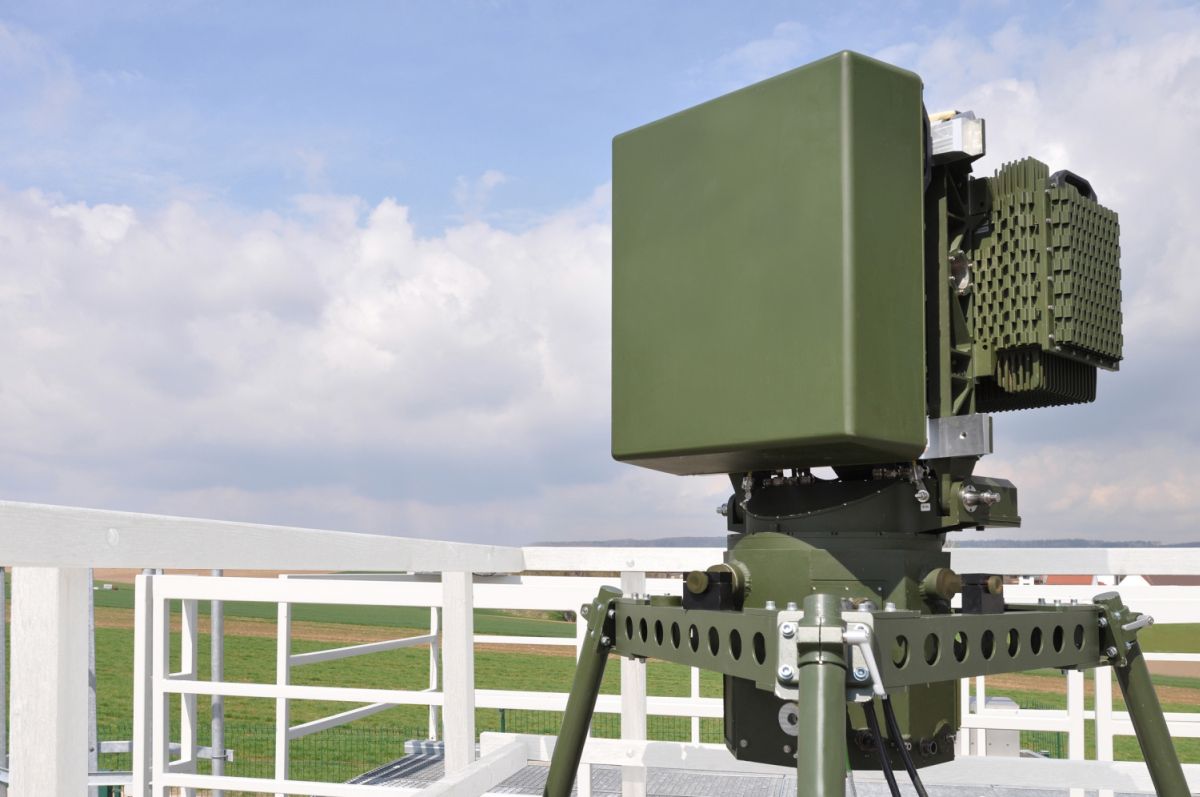WASHINGTON — A Pentagon ceremony today formally inscribed the name of Army Special Forces Staff Sgt. Robert J. Miller, who yesterday was awarded a posthumous Medal of Honor, onto the nation’s list of military heroes.
In January 2008, Miller, at age 24, died in action in Afghanistan, charging the enemy through a hailstorm of bullets to give 22 other soldiers a chance to survive. Today, Miller’s family, teammates, and friends gathered at the Pentagon alongside the U.S. military’s most-senior leaders to honor their fallen son’s life, heroism and courage.
Today’s Pentagon ceremony marked Miller’s entry into the building’s Hall of Heroes, where his name and the details of his service will join those of other Medal of Honor recipients.
Defense Secretary Robert M. Gates praised Miller’s bravery and sacrifice, and the sacrifice of Phil and Maureen Miller, the fallen soldier’s parents.
“Every evening I write notes to the families of young Americans — as I did to the Millers — who have given this country the supreme sacrifice,” Gates said. “They are our country’s best, the nation’s sons and daughters, who answered the call of service to defend this country in a time of war.”
Servicemembers such as Miller, Gates said, had “answered what Theodore Roosevelt described as ‘the trumpet call,’ which he said: ‘Is the most inspiring of all sounds, because it summons men to spurn all ease and self-indulgence and bids them forth to the field where they must dare and do and die at need.’ ”
“Rob [Miller] was one who answered that trumpet call, one who also possessed that extra measure of courage and determination to be at the very tip of the spear in America’s wars,” the secretary said.
Gates also recounted the medal’s history and meaning.
“Over the past century, it has gone only to the bravest of the brave, with fewer than a thousand recipients out of the millions of Americans who have served in uniform during that time,” Gates said. “It goes to those who demonstrate exceptional bravery in the face of enemy fire. But it also demands something more of an individual: The knowledge that by embarking on a course of action, losing one’s life is not only possible, it is quite likely.”
During Army Secretary John M. McHugh’s remarks at the ceremony, he described Miller’s interests in gymnastics, basketball, history, languages and the military as he was growing up. Later, as a young Green Beret, Miller brought his characteristic intensity, enthusiasm, leadership and dedication to the job, the Army secretary said.
“He was funny, generous, passionate and determined,” McHugh said of Miller. “He was someone we would all have liked to know … a life that while too short, was a life of extraordinary measure.”
Army Chief of Staff Gen. George W. Casey Jr. said during the ceremony that Miller’s life offered “a glimpse of what is best about our country.” And watching Miller’s parents, brothers and sisters interact, Casey said, made it clear how the young man had turned out to be so extraordinary.
“Each of them had a role in making Robert the man that he was,” Casey said.
The Millers accepted a Medal of Honor flag on their fallen son’s behalf, and unveiled the plaque bearing his name that will be displayed in the Hall of Heroes.
Phil Miller spoke of his son before the ceremony’s conclusion.
“Robert loved what he was doing very much,” Miller said. “He was proven to be very good at what he was doing. And there was no question that he was confident he was fighting and serving for a good cause.”
Miller said his son was a normal, active, mischievous boy while growing up.
“My wife and I believe he is a great example of what America’s youth can do, and how well they can perform, when they’re given the responsibility and the opportunity to do so,” he said.
“We miss him terribly.”
Miller’s actions in Afghanistan as weapons sergeant for Company A, 3rd Battalion, 3rd Special Forces Group have been much-publicized since the award of his medal was announced in September. But a few days before the January 25, 2008, ambush where Miller gave his life, he and a teammate had talked about how they wanted to be remembered.
In an interview before this week’s ceremonies, Staff Sgt. Nicholas McGarry said during that conversation, Miller had told him he wanted to be remembered for how he had lived, and not how he died. As the two single guys on the team, McGarry recalled that he and Miller hung out together, and rode mountain bikes after work.
“He was incredibly joyful – a motivated, energetic person,” McGarry said of his departed friend. “Just a good friend to have around, because he always wanted to do something. He was always in a good mood –- kind of a playful spirit, I guess.”
McGarry said he thinks about Miller every day.
“He was a good friend,” McGarry said. “But if it wasn’t for him, I wouldn’t be here.”
President Barack Obama yesterday presented the Medal of Honor posthumously to Miller’s parents during a ceremony held in the East Room of the White House.
Source:
U.S. Department of Defense
Office of the Assistant Secretary of Defense (Public Affairs)

 von
von 

